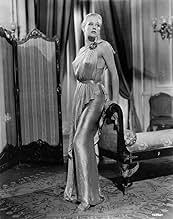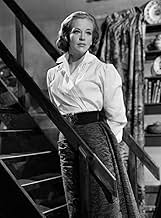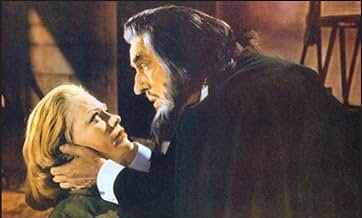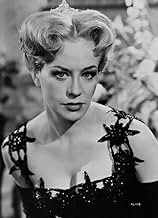Adicionar um enredo no seu idiomaThe story of a genius who hypnotizes an artist's model into becoming a great concert singer, and how she escapes from his influence only by his death.The story of a genius who hypnotizes an artist's model into becoming a great concert singer, and how she escapes from his influence only by his death.The story of a genius who hypnotizes an artist's model into becoming a great concert singer, and how she escapes from his influence only by his death.
- Direção
- Roteiristas
- Artistas
- Indicado para 1 prêmio BAFTA
- 1 indicação no total
Hildegard Knef
- Trilby
- (as Hildegarde Neff)
- Direção
- Roteiristas
- Elenco e equipe completos
- Produção, bilheteria e muito mais no IMDbPro
Avaliações em destaque
This is quite an unusual film in that certain scenes don't make a lot of sense - storylines are clumsily and swiftly manifested with no real development and thus there is no real tension when there needs to be, however, it is visually interesting and at times beautifully lit and shot with great and believable sets.
I'm not sure if the script or the editing is at fault but think that it's some of both in equal measure that leaves the viewer at times thinking "Why was that just said?" or "Why did that character just behave like that?" or "How much time has passed between the last scene and this scene?" or "Ok, so this now appears to be the main thread of the story, why was it so long in being made apparent and why was it developed so clumsily" etc. These questions arising really put in my mind the appalling (but awfully good fun) script, and (lack of) continuity of Tommy Wiseau's "The Room".
Apart from it's script and editing/continuity reminding me of "The Room" and the storyline being reminiscient of "The Red Shoes" - possessive control-freak older man, seeks to control young woman performing against the will of her lover, - "Svengali" also reminds me of another unusual film set in Paris and made in the 1950s called "Man On The Eiffel Tower". This film is also visually interesting and nicely art-directed but also suffers from (at times) an unintelligable script and very poor continuity.
The intention of "Svengali" is of course good but poor execution of basic story-telling damages the impact of the film substantially - but I still quite liked it!
Look out for the very young and beautiful, (uncredited - even though he has some lines), great Jeremy Brett in his first feature.
I'm not sure if the script or the editing is at fault but think that it's some of both in equal measure that leaves the viewer at times thinking "Why was that just said?" or "Why did that character just behave like that?" or "How much time has passed between the last scene and this scene?" or "Ok, so this now appears to be the main thread of the story, why was it so long in being made apparent and why was it developed so clumsily" etc. These questions arising really put in my mind the appalling (but awfully good fun) script, and (lack of) continuity of Tommy Wiseau's "The Room".
Apart from it's script and editing/continuity reminding me of "The Room" and the storyline being reminiscient of "The Red Shoes" - possessive control-freak older man, seeks to control young woman performing against the will of her lover, - "Svengali" also reminds me of another unusual film set in Paris and made in the 1950s called "Man On The Eiffel Tower". This film is also visually interesting and nicely art-directed but also suffers from (at times) an unintelligable script and very poor continuity.
The intention of "Svengali" is of course good but poor execution of basic story-telling damages the impact of the film substantially - but I still quite liked it!
Look out for the very young and beautiful, (uncredited - even though he has some lines), great Jeremy Brett in his first feature.
A better example of over-acting you will struggle to find in this overly theatrical adaptation of George Du Maurier's 1894 novel "Trilby". Hildegard Knef is a young, impressionable, girl who falls under the spell of the almost Rasputin-esque Donald Wolfit in the title role. He hypnotises her to rid her of pesky headaches, and give her the voice of an angel - and soon she becomes an international star of the opera. Robert Newton was originally slated for the lead, but I can't imagine he could have done better than Wolfit, who has the maniacal look (eyes, especially) and pithy dialogue down to a T. The support from Terence Morgan - as her much younger beau "Billee Bagot", Paul Rogers, David Kossoff and the truly wonderful singing of Elisabeth Schwarzkopf keep this entertaining enough, but the staging and style are just to limiting to let this version of a really menacing and evocative story soar.
One of several big screen adaptations of du Maurier's TRILBY, this was notable for utilising the author's original illustrations in costume, and to some extent, settings. It also had the benefit of a characteristically flamboyant and forceful performance from the great Donald Wolfit. He's able to engender a small degree of sympathy for the grubby and boorish Svengali (including his frustration, as a classical musician, with Trilby's continual rendering of a rather wan little ditty, 'Alice, Where Art Though?' later to form the aptly dowdy signature tune to OPEN ALL HOURS). He's compelling whenever the film focuses on him, despite more than a touch of Frankie Howerd in places. Unfortunately it concentrates rather too much in the early stages on the ageing English art students, and not helped by some crude editing, the story doesn't grip as it should. Hildegarde Neff brings beauty, intelligence and a sense of vulnerability to Trilby, but she comes over as about as Irish as Elisabeth Schwarzkopf, whose sublime lyric soprano tones are heard on the soundtrack. Terence Morgan can make little impact as Billy, and despite being good to look at, with the colour and atmosphere of the early Hammer horrors, the whole enterprise is lacking in drive, with too many short scenes on cramped sets. The finale at Covent Garden where Svengali dramatically relinquishes his hold on Trilby is especially disappointingly handled, with the director failing to build any tension or sense of occasion, then allowing what remains to fall flat.
One of those films that has its moments, but falls firmly into the 'could have been so much better' category.
One of those films that has its moments, but falls firmly into the 'could have been so much better' category.
Apparently this is the tenth(!) screen version of George Du Maurier's "Trilby" but only the second one I have watched myself thus far – the other being the classic 1931 John Barrymore version from Warner Brothers entitled SVENGALI, of course. Presently, I will also be getting to the similarly-titled modernized TV version of 1983 starring Peter O'Toole and Jodie Foster but, for the record, there are two more adaptations I am most interested in, which are Maurice Tourneur's Silent original TRILBY (1915; which is available on DVD from Alpha!) and the "BBC Play Of The Month" TV version from 1976 with Alan Badel. Anyway, back to the version at hand: apart from the truly wretched copy I got saddled with (comprising constant combing and intermittent freezing issues!), I quite liked this handsomely-mounted and literate (if clearly stage-bound and clumsily edited) adaptation that benefits greatly from two excellent central performances: albeit a last-minute replacement for the ailing Robert Newton and clearly overweight for the role of the insufferable Svengali, Donald Wolfit's bizarrely effective combination of Bela Lugosi's looks and Frankie Howerd's voice earned him a nod at the British Film Awards; on the other hand, the overage but beautiful Hildegarde Neff is suitably moving as the innocently sensual gamine Trilby. The rest of the notable cast includes Terence Morgan (as Little Billy), David Kossoff (as Gecko), Noel Purcell (as Trilby's father), Michael Hordern (as Morgan's disapproving minister uncle) and, as starving Parisian painters, Alfie Bass, Harry Secombe and Michael Craig!
Donald Wolfit gets my vote as Best Animated Cartoon character of 1955. He cracks his fingers before 'playing' the piano, just like Bugs Bunny!
I think this Svengali dies of overacting.
There is a special bonus in this film: an uncredited (and very young) Jeremy Brett appears as a very happy art student in two sequences. He has a few lines and some nice closeups, and even gets to sing along with Harry Secombe on "Alice Where Art Thou". A curious concept.
Hildegarde Knef is very beautiful and the film is nicely art directed, except when she wears the Dior gowns. And the 'art' is pure Fifties kitsch. Some of the dialogue is so hilarious you will be yelling along with it, ROCKY HORROR-SHOW style.
I think this Svengali dies of overacting.
There is a special bonus in this film: an uncredited (and very young) Jeremy Brett appears as a very happy art student in two sequences. He has a few lines and some nice closeups, and even gets to sing along with Harry Secombe on "Alice Where Art Thou". A curious concept.
Hildegarde Knef is very beautiful and the film is nicely art directed, except when she wears the Dior gowns. And the 'art' is pure Fifties kitsch. Some of the dialogue is so hilarious you will be yelling along with it, ROCKY HORROR-SHOW style.
Você sabia?
- CuriosidadesHildegard Knef's singing was dubbed by Elisabeth Schwarzkopf.
- Citações
Svengali: If you choose you can put all that nonsense behind you forever.
Trilby O'Farrall: And do what, starve?
Svengali: Not if you put your trust in me absolutely, not if you do exactly what I tell you to do.
- Cenas durante ou pós-créditosOpening credits prologue: Paris The Latin Quarter at the turn of the Century
Principais escolhas
Faça login para avaliar e ver a lista de recomendações personalizadas
Detalhes
- Data de lançamento
- País de origem
- Idioma
- Também conhecido como
- Sihirbazın İntikamı
- Locações de filme
- Nettlefold Studios, Walton-on-Thames, Surrey, Inglaterra, Reino Unido(studio: filmed at)
- Empresa de produção
- Consulte mais créditos da empresa na IMDbPro
- Tempo de duração
- 1 h 22 min(82 min)
- Cor
- Proporção
- 1.37 : 1
Contribua para esta página
Sugerir uma alteração ou adicionar conteúdo ausente



































